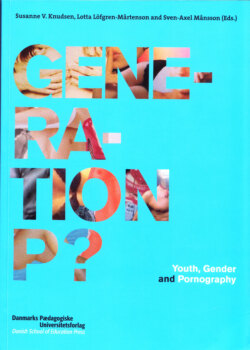Читать книгу Generation P? - Группа авторов - Страница 30
На сайте Литреса книга снята с продажи.
Impure alliances
ОглавлениеThe ambivalence between the subversive and the repressive leads to difficult and complex questions. The discourses of the market are simultanesly force, offers and new possibilities of signification and action. A frequently repeated argument is that many of the representations of mainstream sexualisation are situated in a consumer-oriented culture characterized by the neo-liberalistic response to the citizens’ need for recreation, consumption, and comfort. We may, however, regard some aspects of mainstream sexualisation in general and as found in RosaProsa’s new-feminist mode in particular, as a partial detachment from conventional ethics, usefulness and normative stability. We may also consider whether some elements of sexualisation in culture and the media may be regarded as a form of mainstream experimentation rather than efforts to liberate norms of sexual conduct. The way I see it, this also implies a will to communicate openly in public, and not only in established critical forums or the avant-garde aesthetics of high culture. This also means criticising and politicizing the trend of mainstream sexualisation as well as acknowledging destabilizing and queer elements in a sexualisation trend which otherwise would appear to blend seamlessly with the private and repressive logic of consumption. Mainstream experimentation might also signal that the polarization or dichotomous alternative between liberation/containment has no final answer.
The critical reception of Rosa Prosa blends in the tendency in the Scandinavian academic evaluation of the trend of mainstream sexualisation and sexualized postfeminist representations. The perspective of backlash and the perceived dismantling of feminism are predominant. Despite the influence of the Scandinavian welfare-state model, gender-equality ideal and the wave of new-feminism in media and culture, the perspective of experimentation seems marginal in the evaluation. This is remarkable because sexualisation in media and culture implies a genuine diversity of aesthetics, discourses, ethics and ideological positions concerning sexuality. This actual plurality and the ideological and aesthetic contradictions in the representations of sexualisation do, in sum, contribute to the de-territorializing of sexuality from predetermined places, rooms, and metaphors, and from predictable social structures, hierarchies and myths (Merck 2000). This helps loosen the connection between the hegemonic discourses which have confined the meanings of sexuality.
Despite society’s willingness to regulate and utilize sexuality, the sheer number of sexual representations produced means that unpredictable and unintended counter-discourses and counter-effects will be produced as well. These effects oppose against the reduction of sexuality to usefulness, whether those agendas are set by the market, the welfare state, feminists, or others. Mainstream sexualisation does, after all, also imply a loss of control – a semiotic experimentation which cannot simply be recuperated (Bersani 1988). This instability in the representation of sexual discourses cannot, however, automatically be presumed benefit with radicalism or subversion (McNay 2002, 56).
The critics of Rosa Prosa have reacted to this last argument by pointing out that talking about sexuality is hardly liberating in a culture which does little else, and by arguing that feminism should be about more important things. I have argued that the binary relationship between what is perceived as commercial and repressive and what is subversive and liberating stands in the way of an understanding of the potentials, problems and paradoxes of cultural mainstream sexualisation. The new-feminist embrace of contemporary trends in popular culture, such as sexual autobiography and sexuality as a metaphor for change show that there are no certain indicators for subversion or for the political potentials of these representations. In Scandinavia, the wave of new-feminism has insisted upon using popular genres and mainstream sexualisation in order to communicate and thus gain a voice in public debate. In this manner new-feminism has re-politicized feminism, sexuality and intimacy, stimulated discussion of current norms, and broken down the clear cut boundaries between academia, politics and mainstream popular culture.
